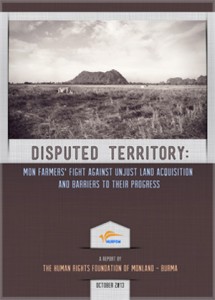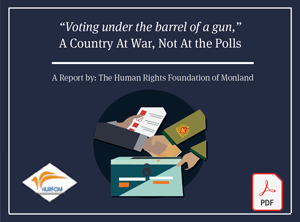Village welcomes Mon language instruction back to government school
October 21, 2013
WCRP:After two decades of Mon language instruction being barred from government classrooms, a combined primary and middle school in Yebyu Township’s Yaphu village has received government go-ahead to once again teach their mother tongue. Villagers said they celebrated the decision but were disheartened that government funding for the language classes would reportedly not be released until 2014. Nonetheless, in a move to rally around the newly won consent, the community sought donations from the village administration, local residents, and the area’s predominant ethnic resistance group, the New Mon State Party (NMSP), to immediately commence Mon language classes for primary schoolchildren. Read more
UN Day of the Girl Child and eradicating the “black spot” of harassment
October 11, 2013
WCRP: Today marks the United Nation’s annual “International Day of the Girl Child” with the theme “Innovating for Girls’ Education.” This year, the UN is highlighting the roles that technology and innovation in policies, partnerships, and resource utilization play in advancing girls’ access to education, calling for “fresh and creative perspectives to propel girls’ education forward.” Read more
Villagers pursue plantation land confiscated 20 years ago
October 11, 2013
HURFOM: Mon members of parliament have stepped in to assist villagers in a rubber-producing area of Thanbyuzayat Township, Mon State, to appeal for the return of land confiscated almost 20 years ago. Residents reportedly received no compensation at the time of seizure and are eager to seek restitution for land that, by current price estimates, is valued at 6 million kyat per acre.
The village of Ka Loh Sa Kaw is comprised of roughly 130 households and numerous rubber plantation workers. In 1994, local wealthy man Nai Phaw allegedly confiscated more than 150 acres of land owned by 17 village residents. According to reports, Nai Phaw was not affiliated with any powerful political groups, but instead bribed the village administrator, Nai Kon Blai, to secure local government support for the confiscations.
Today, Nai Kon Blai is four years deceased and Nai Phaw, over 70 years old, still runs the patchwork of confiscated plots with more than 60 laborers working to tap the rubber trees.
Residents said they were afraid to challenge the village administrator at the time and later were unsure how to approach authorities about reclaiming the land, but that now Mon parliament members from Thanbyuzayat guided them to submit an appeal.
“When our lands were confiscated, the village administrator and Nai Phaw had power by relying on the [local] government so the villagers did not dare oppose them,” said Nai Tun Tin, 51, who lost 20 acres of his rubber plantation to Nai Phaw. “We had to give our land because we were weak to stand against them. If we had not been afraid, they would not have been able to take [our land]. We did not know how to speak out but now we know how and want to get our land back with help from Mon parliament members.”
Mon MP Nai Tun Ohn coordinated the submission of a letter of appeal four months ago on behalf of the 17 victims, but said a decision has yet to be handed down.
Disputed Territory: Mon Farmers’ Fight Against Unjust Land Acquisition And Barriers To Their Progress
October 9, 2013
A. Introduction
Over the years HURFOM has produced a number of accounts highlighting the hardships faced by Mon farmers who became victims of land confiscation or unjust land acquisition.[1] In this report HURFOM follows-up on previously documented abuses and concentrates on an emerging new trend: farmers’ active and collective pursuits for rights to their land.HERE Read more
Report Brief: Disputed Territory: Mon farmers’ fight against unjust land acquisition and barriers to their progress
October 9, 2013
Introduction
 Over the years HURFOM has produced a number of accounts highlighting the hardships faced by Mon farmers who became victims of land confiscation or unjust land acquisition.[1] In this report HURFOM follows-up on previously documented abuses and concentrates on an emerging new trend: farmers’ active and collective pursuits for rights to their land. For Full report, please view HERE. Read more
Over the years HURFOM has produced a number of accounts highlighting the hardships faced by Mon farmers who became victims of land confiscation or unjust land acquisition.[1] In this report HURFOM follows-up on previously documented abuses and concentrates on an emerging new trend: farmers’ active and collective pursuits for rights to their land. For Full report, please view HERE. Read more
HURFOM releases “Disputed Territory” to highlight unjust land acquisition in Mon areas
October 9, 2013
The Human Rights Foundation of Monland (HURFOM) has released a report titled “Disputed Territory: Mon farmers’ fight against unjust land acquisition and barriers to their progress,” to illustrate contemporary struggles against past and on-going land disputes. Drawing from almost 100 interviews conducted in Ye, Yebyu, and Kyaikmayaw townships, the report presents cases of land confiscation and abuse in Mon areas and elevates the voices of farmers who are actively pursuing justice. Read more
Girl abducted from Kyone Ka Yote primary school
October 4, 2013
HURFOM: Residents of Kyone Ka Yot, a village located a few miles from Thanbyuzayat City in central Mon State, alleged that the recent kidnapping of an 11-year-old girl revealed the extent of police corruption and human trafficking trends in the area. According to locals, seven cases of human trafficking have already been confirmed in Thanbyuzayat and Mudon townships this year, all targeting children between the ages of 7 and 15, and family members of the disappeared young girl fear the worst. Read more
Anin villagers appeal to reclaim public land for new hospital
October 1, 2013
HURFOM: Residents of Anin village in Thanbyuzayat Township submitted an appeal to Mon State members of parliament last week seeking resolution to a land dispute they described as over ten years in the making.
In 1977, local man Nai Rin donated four acres of his land to the village for public use, and for decades residents dutifully maintained the property until a community project could be assigned to it. However, between 2001 and 2006 during the village administrative term of U Win Kyi, the land was allegedly parceled off to private buyers for 200,000 to 250,000 kyat per 40 x 60 foot plot. Read more
Robbery revives old fears in Ta Ra Nar village
September 27, 2013
HURFOM: The rice-producing farmlands of Ta Ra Nar village in Kyaikmayaw Township are home to roughly 2,000 households comprised primarily of ethnic Mon families. The village is also known for its significant number of security officials based in the area, including state police, local militia forces, and members of the New Mon State Party (NMSP), the predominant ethnic Mon resistance group. For this reason, when a robbery took place unimpeded earlier this week in a home centrally located among various security forces, residents reported a wave of anxiety that evoked past feelings of a village life characterized by absent rule of law and recurring safety concerns. Read more
Kyauk Kadin Residents Detail Incident of Extortion
September 20, 2013
HURFOM: The situation for Yebyu Township locals continues to deteriorate under the unchecked influence of a Mon splinter group. The group continues to terrorize and extort villages despite the regional presence of the Burmese Military. Reports of extortion and torture highlight the lackluster security situation in the area straddling northern Yebyu Township and southern Ye Township. Read more





















































